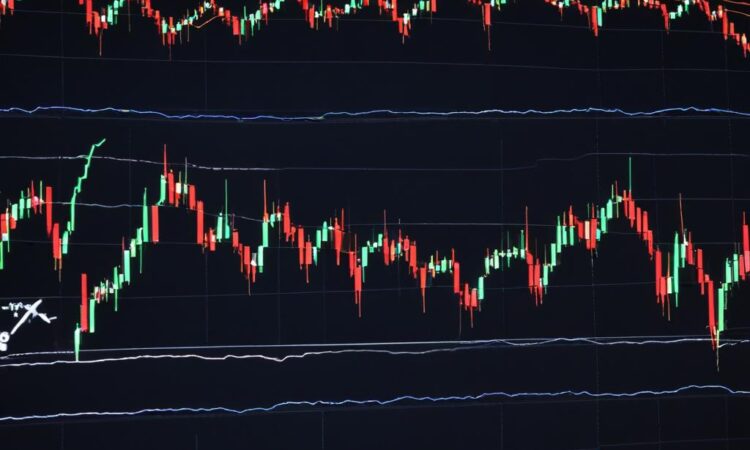Share Falls Ease After Trump Tariff Turmoil
US shares regained some ground after falling sharply in early trade as Trump paused tariffs on Mexico and Canada. The initial market reaction to the President’s announcement of impending tariffs had sent shockwaves through the financial world, leading to significant drops across major indices. However, the subsequent pause, albeit temporary, provided a much-needed reprieve, allowing investors to reassess their positions and cautiously regain some confidence.
Analysts attribute the initial sell-off to concerns about the potential for a protracted trade war, the escalating tensions between the US and its key trading partners, and the uncertainty surrounding the global economic outlook. The threat of tariffs on Mexican and Canadian goods, already facing existing trade disputes with China and the European Union, added another layer of complexity and risk to the already fragile global trade landscape. Many feared a domino effect, with further retaliatory measures and a potential descent into widespread protectionism.
The pause on tariffs, however, offered a glimmer of hope. While the underlying issues remain unresolved, the temporary reprieve allowed investors to digest the news and focus on other factors influencing the market. Some believe that the pause is a strategic move by the administration to negotiate better trade deals, leveraging the threat of tariffs as a bargaining chip. Others remain skeptical, warning that the situation is far from resolved and that further volatility is likely in the coming weeks and months.
The impact on various sectors was varied. The automotive industry, heavily reliant on cross-border trade with both Mexico and Canada, experienced particularly sharp initial declines. However, the pause on tariffs brought some relief, although the long-term implications for the sector remain uncertain. Similarly, the technology sector, which is highly sensitive to global trade dynamics, also saw significant early losses, but recovered some ground following the news of the tariff pause.
Experts caution against reading too much into the short-term market reaction. The underlying tensions remain, and the future trajectory of US trade policy continues to be a major source of uncertainty. While the pause offers some breathing room, it doesn’t resolve the fundamental issues driving the trade disputes. Further negotiations and potential compromises will be crucial in determining the long-term consequences for the global economy.
The economic impact of the trade war, even with the temporary pause, is likely to be felt across various sectors and countries. Supply chains will need to adapt, businesses will need to adjust their strategies, and consumers will likely experience some price increases. The uncertainty surrounding trade policy adds another layer of complexity to economic forecasting, making it difficult to predict the full extent of the impact.
Many economists believe that a prolonged trade war would significantly harm global economic growth. The imposition of tariffs leads to higher prices for consumers, reduces consumer spending, and disrupts established trade relationships. Furthermore, the uncertainty surrounding trade policy creates a climate of fear and instability, discouraging investment and hindering economic expansion.
The situation remains fluid, with ongoing negotiations and the potential for further shifts in trade policy. The markets will continue to react to new developments, and investors will need to closely monitor the situation to assess the risks and opportunities. The temporary relief provided by the pause on tariffs should not be mistaken for a resolution of the underlying tensions.
The current situation highlights the interconnectedness of the global economy and the significant impact of trade policy on financial markets. The ability of governments to manage trade disputes effectively and find mutually beneficial solutions is crucial for maintaining global economic stability and prosperity. The path forward remains uncertain, requiring careful diplomacy and a commitment to finding common ground.
Further analysis of the market’s reaction will be needed to fully understand the impact of the tariff pause. Experts are closely examining the data to determine whether the recovery is sustainable or merely a temporary reprieve. The longer-term implications for global trade and the world economy will depend on the outcome of the ongoing negotiations and the future direction of US trade policy. The uncertainty continues to be a dominant factor influencing investment decisions and economic forecasts.
The ongoing trade disputes serve as a reminder of the inherent risks associated with protectionist policies. While some argue that tariffs are necessary to protect domestic industries, others contend that they ultimately harm consumers and stifle economic growth. The debate over the optimal balance between protectionism and free trade continues to be a central theme in economic policy discussions worldwide.
The current situation underscores the importance of international cooperation and the need for multilateral solutions to global economic challenges. Finding a way to navigate these complex trade issues requires a collaborative approach, with countries working together to find solutions that benefit all parties involved. The alternative – a protracted trade war – poses significant risks to global economic stability and prosperity.
In conclusion, while the pause on tariffs has provided some temporary relief to the markets, the underlying issues remain unresolved. The long-term impact of the trade disputes will depend on future developments and the ability of involved parties to find mutually beneficial solutions. The global economy remains vulnerable to further volatility, and investors should carefully consider the risks and uncertainties associated with the ongoing trade tensions.
The complexities of international trade and the significant impact of trade policy decisions on global economic stability highlight the need for a carefully considered and nuanced approach. Short-term gains should not be prioritized over long-term stability and cooperation. The path towards resolving these disputes requires a collaborative effort, prioritizing mutual benefit over unilateral actions.

